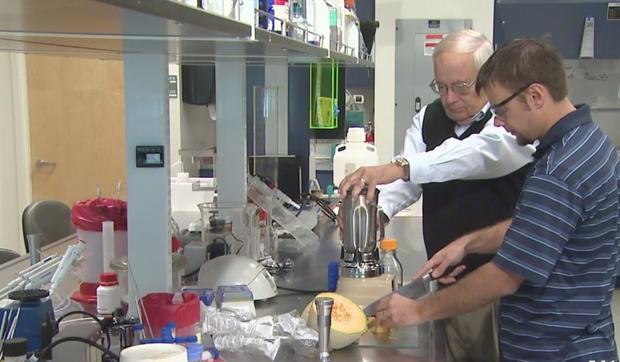School Of Mines Researchers Invent Listeria Detector
By Kathy Walsh
GOLDEN, Colo. (CBS4) - Researchers at Colorado School of Mines have come up with a way to protect our food. Their invention can actually prevent the spread of foodborne diseases. It's a faster, easier way to detect Listeria bacteria. It's designed to keep contaminated food from making it to the marketplace.
You may remember, in 2011, a Listeria outbreak was linked to the cantaloupes from Jensen Farms near Holly, Colorado. Thirty-three people died and more than 100 others were sickened in 28 states.
In a chemistry lab at Colorado School of Mines, researchers have been working to prevent the spread of potentially deadly Listeria.
Graduate student Nick Stambach has been designing a Listeria detector. It's essentially a modified home pregnancy test. Stambach showed CBS4 that with cantaloupe, the melon is blended then put in a solution.
"The purpose is to grow the bacteria up to a concentration we can detect," Stambach explained.
The concentration is then mixed with a virus that only attacks Listeria. A sample is added to a specially designed test strip.
"If we see a line, it's a positive test on the strip. And if we don't see a line, it's a negative and it's safe," said Professor Emeritus Kent Voorhees, Ph.D. who has been overseeing the Listeria research. Voorhees said the procedure can be done on the farm or in the processing plant and takes just 24 hours.
"(It's) all about safety," Voorhees said.
He added that the device would be able to detect Listeria before the food ever got to someone's table. And it could be modified to test for salmonella and E. coli.
For now, the invention is still in the development stage. The hope is eventually it will be commercially available to prevent a Jensen Farms from ever happening again.
This project was supported with funds from Colorado's Advanced Industries grant program. The Colorado Office of Economic Development and International Trade runs it. The program funds inventions from research universities in one of the designated industries that are important to the Colorado economy. These funds allow the researchers to move the technologies closer to the market by answering key commercial and scientific questions.
Part of the money comes from Colorado gaming revenue. Black Hawk pays the majority of gaming tax money in Colorado with around $5.8 million a year contributed to programs like the one at School of Mines. This is Black Hawk's 25th year of gaming.
Kathy Walsh is CBS4's Weekend Anchor and Health Specialist. She has been with CBS4 for more than 30 years. She is always open to story ideas. Follow Kathy on Twitter @WalshCBS4.




